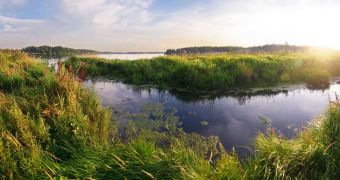Dirty fuels might be the poster child of climate change and global warming, but, as it turns out, wetlands too need be counted among the contributors to these phenomena.
In a paper published in yesterday's issue of the journal Global Change Biology, researchers argue that there is a link between wetland emissions and a recent increase in atmospheric methane concentrations.
They explain that, up until 2007, atmospheric concentrations of methane remained fairly stable. However, they are now gradually increasing, and scientists believe that thawing northern wetlands are the ones to blame for it.
Thus, they say that, despite lower local temperatures, wetlands in our planet's northern regions are now becoming major methane emitters. Hence, they are fueling both climate change and global warming.
“Our analyses show that northern fens, such as those created when permafrost thaws, can have emissions comparable to warm sites in the tropics, despite their cold temperatures,” Professor Merritt Turetsky said in a statement.
“That's very important when it comes to scaling methane release at a global scale,” the University of Guelph in Canada researcher went on to explain.
According to Science News, specialists base their claim that wetland emissions need be linked to an increase in atmospheric methane levels on information obtained while analyzing nearly 20,000 field data measurements.
These measurements were taken at 70 sites in arctic, temperate, and tropical regions, and they focused on methane emissions. “Our synthesis of data from a large number of observation points across the globe is unique and serves an important need,” Narasinha Shurpali with these University of Eastern Finland wished to stress.
With the help of this information, researchers were able to determine that, in the case of wetlands, even small changes in local temperatures can cause soils to release much more methane into the planet's atmosphere than they would normally do.
Still, evidence indicates that soil moisture also has a say in the matter. Thus, methane emissions have been documented to up under warmer and wetter conditions. Whenever wetland soils dried out, either due to evaporation or because of human drainage, methane emissions were shown to fall.
The specialists who took part in this research project recommend that future investigations focus on keeping tabs on thawing northern wetlands and wetlands in the tropics, and on how these natural ecosystems influence atmospheric greenhouse gas emissions and concentrations and, consequently, climate change and global warming.
They further explain that future studies must also take into account how human interference, i.e. toying with the moisture of local soils, can influence wetland methane emissions.

 14 DAY TRIAL //
14 DAY TRIAL //